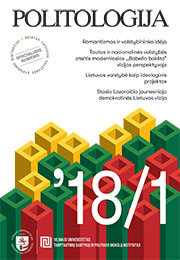Romantizmas ir valstybininko idėja
The conflict between romanticism and the idea of the statesman
Author(s): Alvydas Jokūbaitis, Linas JokubaitisSubject(s): Political Philosophy, Political Theory, Governance, Politics and law, History and theory of political science
Published by: Vilniaus universiteto leidykla & VU Tarptautinių santykių ir politikos mokslų institutas
Summary/Abstract: Schmitt was right to point out the apolitical nature of Romanticism. The romantic relationship with the world turns politics into an occasion for an individual to showcase the creative powers of one’s imagination. This leads to the aesthetic and emotional interpretation of the daily political phenomena. It gives rise to the perspective of an external observer who has no practical interest in the processes that are observed. Romantics are concerned with the emotional and aesthetic relationship with politics, and this is the source of their political passivity. The romantic relationship with the world is opposed to the idea of the statesman. The statesman is, by definition, not only an active citizen. He has to rise up to the highest standards of political leadership. The statesman has to lay the foundations for the principles that are to determine the state for future generations. In many important aspects, liberal democracy is similar to the principles of Romanticism that were described by Schmitt. Many observations point to the conclusion that the citizens of democratic societies see themselves as individuals endowed with unlimited creativity. They talk about politics but tend to avoid political commitments. The democratic principle of the majority pushes away the idea of the statesman. However, it would be a mistake to think that Romanticism is only the destroyer of the concept of the statesman. On the contrary, Romantics have made serious contributions to the emergence of national states and the statesmen who defended them. Without the impact of the Romantic imagination, it is hard to envision the national movements of Central and Eastern Europe. Schmitt’s conception of political Romanticism is foreign to this region. The historical experience in Central and Eastern Europe shows that Romanticism was more than a purely artistic movement and played an important role in the creation of the political myth of the nation. The activities of the Romantics were often very political. Schmitt did not notice the important connections between the Romantic aesthetics and the nation state. The modern nation state is inseparable from the myth of the nation, which was nurtured by Romanticism. Even by driving out the understanding of the importance of the idea of the statesman, Romanticism preserves the very condition of its possibility – the myth of the nation.
Journal: Politologija
- Issue Year: 2018
- Issue No: 1(89)
- Page Range: 3-22
- Page Count: 20
- Language: Lithuanian

